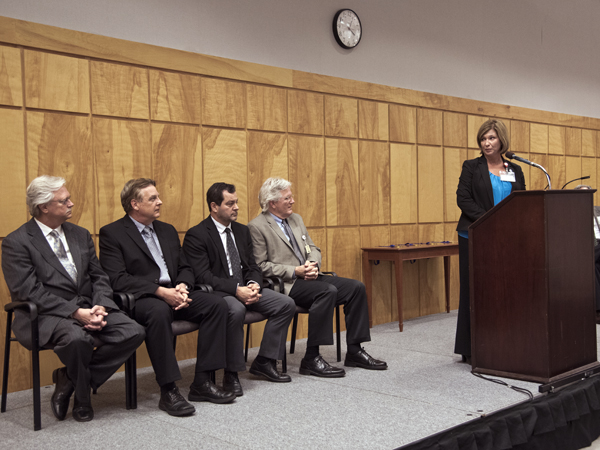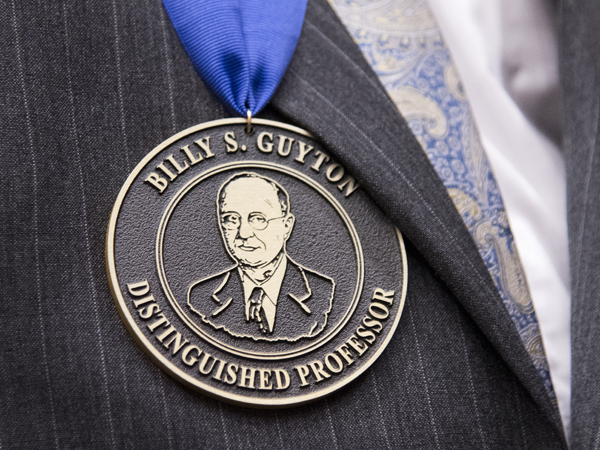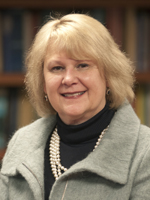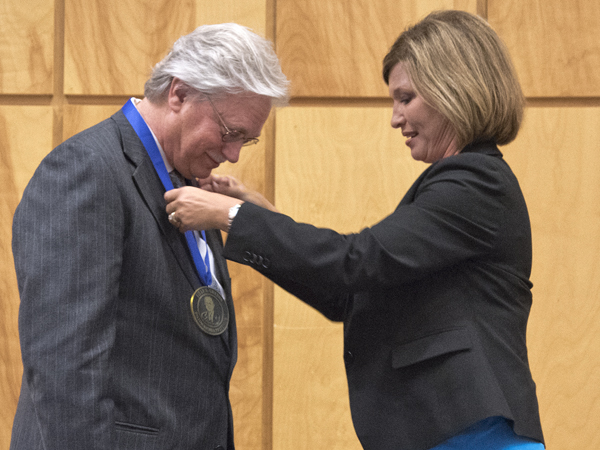UMMC honors distinguished faculty

Published in News Stories on June 22, 2015
University of Mississippi Medical Center administrators named five faculty members to receive Billy S. Guyton Distinguished Professorships, an honor recognizing significant research accomplishments and excellence in teaching.
The honorees' fields spanned the gamut of UMMC's three primary missions: education, research and health care.
"The University of Mississippi is indeed honored to pay tribute to the contributions of Dr. Billy S. Guyton to medical education in Mississippi by awarding these distinguished professorships in his name," said Dr. LouAnn Woodward, vice chancellor for health affairs and dean of the School of Medicine.
Though Guyton Professorships recognize outstanding scholarship, there's no threshold for number of grants or dollar amount of grants for faculty to be considered.

The Billy S. Guyton Distinguished Professor honor is given every five years to faculty who demonstrate a commitment to research and education.
The faculty members chosen by the selection committee for this honor - Drs. Robert Hester, Luis Juncos, Jane Reckelhoff, Richard Roman and Richard Summers - are nationally recognized by their peers and have contributed to the growth and development of the Medical Center, said Dr. Ralph Didlake, vice chancellor for academic affairs, professor of surgery and director of the Center for Bioethics and Medical Humanities at UMMC.
To be eligible, the nominee must be a tenured faculty member with at least five years of service and be an active teacher and researcher with national distinction in his or her area of study, Didlake added.
The distinction, which carries the name of one of the Medical Center's most distinguished early leaders, is awarded every five years.

Reckelhoff
Reckelhoff's research includes studies of gender-influenced hypertension and the mechanisms affecting post-menopausal hypertension. The professor of physiology and biophysics and director of the Women's Health Research Center joined UMMC in 1991 after receiving a Ph.D. in biochemistry from the Medical College of Virginia at Virginia Commonwealth University in 1985 and postdoctoral work at Texas Southwestern Medical School and West Virginia University. She previously was named a Guyton Distinguished Professor in 2010.
Hester's research focusing on cardiovascular responses to obesity has earned continuous funding from the National Institutes of Health, the National Science Foundation, the American Heart Association and the Orthopedic Trauma Association. A professor of physiology and biophysics and director of the Center for Computational Medicine, he earned his Ph.D. in biomedical engineering at the Medical Center after receiving his master's in mechanical engineering from Mississippi State University.
Juncos has continuously researched renal disease and injury while serving as a professor of medicine, a professor of physiology and biophysics and director of inpatient renal replacement therapies. A graduate of the medical school at the Universidad Nacional de Cordoba in Argentina, Juncos would later join the staff at Mayo Clinic in its Division of Nephrology and Hypertension before coming to the Medical Center. His expanding expertise in physiological and translational research related to kidney disease and hypertension is advancing patient care and the education of medical students at UMMC.
Roman, professor and chair of pharmacology and toxicology, has focused his research on renal and cerebral disease, the development of a treatment for diabetes-induced kidney damage and disease, and the role of the adducin protein in the development of renal disease and brain damage from impaired blood flow. Roman received his postdoctoral degree in physiology from Harvard Medical School, after earning his Ph.D. in pharmacology from the University of Tennessee Centers for Health Sciences in Memphis.

Dr. LouAnn Woodward, right, vice chancellor for health affairs and dean of the school of medicine, hangs the Billy S. Guyton Distinguished Professor medallion on Dr. Richard Summers, associate vice chancellor for research.
Summers, associate vice chancellor for research, has more than 300 publications to his credit - most of them focused on the use of computer models for hypothesis formulation and systems analysis to answer biomedical questions. Summers established a national reputation with his work on quantitative models of human physiology on behalf of NASA's Digital Astronaut Program. After earning his M.D. at UMMC, Summers joined the faculty in 1988. Along with his current position as leader of UMMC's research enterprise, he has joint appointments in the Department of Emergency Medicine and in the Department of Physiology and Biophysics.
Dr. Billy S. Guyton served as dean of the School of Medicine from 1935-1944 while it was a two-year school at the University of Mississippi campus in Oxford. He steered it through the Great Depression's ravages, state-level political issues and the near loss of its accreditation. Following his tenure, he served on a planning committee to build the four-year school in Jackson. In 1955, when the new school and hospital opened, Guyton served as its dean emeritus.
His son, Dr. Arthur Guyton, joined the medical school in Oxford in 1947 and built a world-renowned department of physiology and biophysics.
The Billy S. Guyton Professorships were formally the Barnard Distinguished Professorships and were established by former Chancellor R. Gerald Turner to honor the best scholars on the faculty and to provide an incentive for them to remain academically active and associated with the university.


